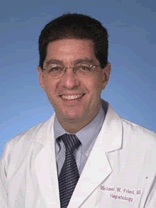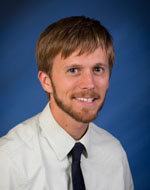Web-based physician mentoring yields an impressive rate of cure for those treated in their community


May 18, 2016
The number of deaths from hepatitis C in 2013 surpassed the total combined number of deaths from 60 other infectious diseases including HIV, pneumococcal disease, and tuberculosis. Also, the number of new hepatitis C cases in the United States doubled between 2010 and 2014.
But in the midst of these discouraging trends, a partnership between Michael Fried, MD, a professor in the UNC School of Medicine and director of the UNC Liver Center, and two physicians of the Rural Health Group in Roanoke Rapids, North Carolina, has produced extremely encouraging results in the treatment and curing of patients with hepatitis C.
Since January 2015, when Fried started having twice-monthly teleconferencing consultations with Richard Moore, MD, and Alison Bartel, MD, 55 patients from the Roanoke Rapids area with hepatitis C have completed 12 weeks of treatment and were found to be free of the virus. Another 25 patients have completed the treatment and are waiting for the test results that will determine whether they, too, have been cured, said Moore, a family practice physician based at Halifax Regional Medical Center.
“Our partnership with Dr. Fried has been a great fit,” Moore said. “He has been a great guy to work with, and we are very pleased with the clinical results of our collaboration has achieved.”
Without the partnership, Moore said, many of these patients may not have been able to get the care they needed, in part because of the distance they would have to travel to see a hepatitis C specialist in person.
For his part, Fried says that his consultations with Moore and Bartel, which he refers to as “telementoring,” have been a “force multiplier” that enabled patients in rural communities to benefit from what he calls “the revolution” in hepatitis C care. The telementoring sessions are based on Project ECHO, developed by Dr. Sanjeev Arora at the University of New Mexico, who first demonstrated that interested primary care physicians could be trained to administer complex therapies to patients with liver disease.
“Hepatitis C care used to be a lot more complex, for both doctors and patients,” Fried said. “But now, because of all the advances over the last 10 to 15 years, we treat hepatitis C with pills – patients don’t have to get injections anymore – and we have a 95 percent cure rate.”
However, many people with hepatitis C remain undiagnosed, Fried said. The Centers for Disease Control and Prevention (CDC) reported that deaths from hepatitis C reached a record high of 19,659 in 2014, and the CDC estimates there are 30,000 new infections each year.
“That’s where partnerships like this one can make a difference,” Fried said. “It enables us to bring the revolution in hepatitis C care to physicians and patients in areas that might otherwise go underserved. Through this partnership, Dr. Bartel and Dr. Moore have both become well versed in the latest standards of care for hepatitis C.”
Moore began working in Roanoke Rapids in August 2014, after completing the Lawrence Family Medicine Residency in Lawrence, Massachusetts. While there, he participated in that institution’s hepatitis C community partnership program. Soon after his arrival in Roanoke Rapids, he began speaking with people at UNC about launching a similar effort.
The partnership between Bartel, Moore and Fried officially got underway a few months later, in January 2015. The group is looking to expand to include other interested practitioners around the state.
May is Hepatitis Awareness Month. For more information, see http://www.cdc.gov/hepatitis/HepAwarenessMonth.htm